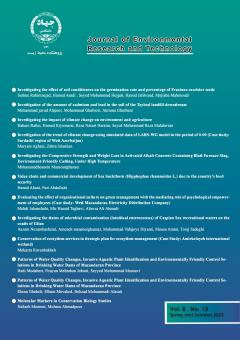-
-
-
Open Access Article
1 - Effect of using dill (Anethum graveolens) whole plant powder on performance of some blood parameters, and skeletal system of broilers
ali Reyan Mohasesi Hasan Darmani Koohi Reza Naseri Harsini Hamed Kioumarsi هوشنگ دهقان زادهTo investigate the effects of the whole dill plant powder different levels on performance of some blood parameters and tibial characteristics of broilers, 200 one-day-old male chicks (Ross-308) were used in a completely randomized design with four treatments and five re MoreTo investigate the effects of the whole dill plant powder different levels on performance of some blood parameters and tibial characteristics of broilers, 200 one-day-old male chicks (Ross-308) were used in a completely randomized design with four treatments and five replicates (10 chicks per replicate). Chicks were randomly distributed among the experimental treatments including 0, 0.5, 0.1, and 0.2% levels of whole dill plant powder. In regards to feed intake and weight gain during the entire growing period, the treatments contained 1% and 2% of dill plant powder had the highest and the lowest feed intake, respectively, and treatments containing 0.5% dill powder and control group were in the middle of the first two treatments (P<0.05). In terms of feed conversion ratio, the only significant difference observed between treatments throughout the entire experimental period was a significant increase in the amount of feed conversion ratio in the chicks treated with 2% dill plant powder. Serum alkaline phosphatase concentration showed a significant increase in both assessing periods (21 and 42 days) for the 2% dill plant powder treatment compared to the other experimental treatments (P<0.05). Serum calcium and phosphorus concentrations were not affected by experimental diets. The weight, length, width, and ash percentage of the tibial bone did not show any significant difference between the experimental treatments. The results of this study showed that using 1% of dill plant powder in broiler chicken diets, while improving growth performance, did not have any adverse effect on skeletal growth and development of chickens. Manuscript profile -
Open Access Article
2 - Effect of Pennyroyal (Mentha Pulegium L.) on Performance, Carcass Characteristics and Some of the Blood Parameters in Broilers
Ali Reyan Mohasesi Hasan Darmani Koohi Reza Naseri Harsini Ali Mirza Aghazadeh Hamed KioumarsiTo investigate the effects of pennyroyal (Mentha pulegium L.) powder on performances, the concentration of some blood parameters and carcass characteristics of broilers, 160 one-day-old Ross chicks were used in the form of a completely randomized design with four treatm MoreTo investigate the effects of pennyroyal (Mentha pulegium L.) powder on performances, the concentration of some blood parameters and carcass characteristics of broilers, 160 one-day-old Ross chicks were used in the form of a completely randomized design with four treatments and four repetitions. Experimental treatments included the levels of zero (control), 0.2%, 0.4%, and 0.6% of pennyroyal powder. The treatment containing 0.6% of pennyroyal powder compared to the control group had higher feed consumption in the starter period (P <0.05). However, there was no significant difference during the growth period and the whole experimental period. In terms of average daily weight gain and feed conversion ratio, there was no significant difference between the experimental treatments during the starter, growth and the whole experimental periods. The carcass percentage decreased significantly at the age of 42 days in treatments containing pennyroyal powder compared to the control group (P <0.05). There was no significant difference between experimental treatments in terms of weight percentage of carcass components including thigh, chest, abdominal fat, heart, liver, and gizzard. The concentration of triglycerides and plasma VLDL decreased significantly in treatments containing pennyroyal powder and decreased linearly compared to the control group (P <0.05). In terms of cholesterol and plasma HDL levels, a significant decrease was observed in treatment containing 0.4 level and treatment containing 0.2 percent of pennyroyal powder compared to the control group (P <0.05) respectively. Plasma LDL levels were not affected by experimental treatments. The results of the present study showed that the use of limited levels of pennyroyal powder up to 0.6% has no significant effect on the performance of broilers. Manuscript profile -
Open Access Article
3 - Effects of different levels of Ajowan Trachyspermum ammi as an alternative to antibiotics on growth performance carcass characteristics and some blood parameters of broiler chickens
ali Reyan Mohasesi Hasan Darmani Koohi Reza Naseri Harsini Hamed KioumarsiThe purpose of this experiment was to evaluate the effects of different levels of powdered dried aerial parts of Ajowan (Trachyspermum ammi) seeds on the performance and carcass traits of broiler chicks. In this experiment one hundred and sixty one-day-old broiler chick MoreThe purpose of this experiment was to evaluate the effects of different levels of powdered dried aerial parts of Ajowan (Trachyspermum ammi) seeds on the performance and carcass traits of broiler chicks. In this experiment one hundred and sixty one-day-old broiler chicks (Ross 308) were used in a completely randomized design with 4 treatments and 4 replicates (with 10 birds each). The experimental treatments included: 1) control group (without additive2) basal diet + 0.2% Ajowan powder, 3) basal diet + 0.4% Ajowan powder, and 4) basal diet + 0.6% Ajowan powder. Results showed that the levels of 0.2 and 0.4 % had no significant effect on daily weight gain, food intake and feed efficiency. Except for carcass weight, Ajowan had no significant effect on carcass characteristics. For blood parameters, the effects of Ajowan, in most cases, were non-significant. In contrast, plasma LDL and cholesterol concentrations decreased significantly with increasing levels of Ajowan powder. According to the obtained results, based on maintaining the bird's performance at the same levels as the control group and on the other hand improving the pattern of blood lipid metabolites, it can be said that Ajowan can be a good alternative to the growth-promoting antibiotic to improve health and solve the environmental problems in this area. Manuscript profile
List of Articles Hasan Darmani Koohi
-
The rights to this website are owned by the Raimag Press Management System.
Copyright © 2017-2024


